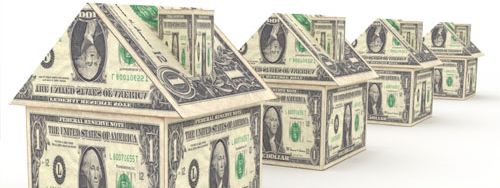
Recently, Charles Schwab & Co. has been running ads with the message "`My house is worth a million' is not a retirement plan."
Sorry, Chuck. In point of fact, home equity accounts for 50% or more of current retiree assets, along with Social Security, 401(k) and other pension assets and other savings. Retirees tap these assets by selling their homes to "trade down" or stay in their homes and borrow against them.
Unfortunately, the importance of home equity is rarely conveyed to Americans—whether it's the investment value of owning one or the dangers or putting your home equity at risk with "risky financing." What follows are the four rules of homeownership that are consistent with our investment philosophy: buy and hold your house just as you do your investments and keep your costs low—in this case, it's the cost of debt. A further explanation of Rule 2 follows.
1. Don't buy a roof that's over your head: If the price of a house that you're looking at it is more than two and a half times your household income (after subtracting the down payment), consider a less-expensive house or moving to an area where the living is easy and homes are affordable. Check out our article: Relocate to your Affordable Dream House to find out more about our six great destinations that fit the bill.
2. Make sure you own your home and not the bank: Consider only fixed-rate mortgages for a term of 30 years or less. Say "no" to adjustable-rate or interest-only mortgages and 40 or 50-year mortgages.
3. Don't "trade up" to a roof that's over your head (unless you get a job in a new location where you can purchase a McMansion for the price of a starter home in your old locale.) You need to "buy-and-hold" your house the same way you buy-and-hold your investments) to maximize your investment returns.
4. Don't suck the equity out of your home with cash-out refinancing or home equity lines of credit.
More Details on Rule Number Two: Limit your home "ower-ship." Make sure YOU own the house—and not your bank—by sticking with a plain-vanilla fixed-rate mortgage.
I n my humble opinion, adjustable-rate mortgages are "bait and switch" (to a higher rate) by another name. The same way that I favor plain-vanilla index funds as investments over managed funds, I'm a fan of plain-vanilla fixed-rate mortgages—in both examples, you are avoiding incurring costs that are a waste of money; the first is the cost of managing funds and the second is interest cost.
What's my beef? The only thing more aggravating than not being able to afford a house is barely being able—or not being able—to afford to make the mortgage payments when rates go up. I speak from experience. I remember having to cut expenses severely when interest rates went up on the ARM on our first house during the late 1980s and feeling like I was at the mercy of the bank. My husband and I vowed that when we moved to our next home we'd get a fixed-rate mortgage so we'd never have to experience "interest rate anxiety" again.
Why we're down on adjustable-rate mortgages: Adjustable rate mortgages are particularly popular in high priced regions of the country because the low initial rate appears to qualify more borrowers for high priced homes. However, banks are not required to offer you mortgages that you can STILL afford if interest rates rise faster than your income. The result is more wild and crazy mortgages that only Donald Trump can afford.
Here's an example: On a $150,000, one-year adjustable-rate mortgage with 2/6 caps (the rate can't go any higher than two percentage points at each adjustment; no more than six percentage points over the life of the loan), your 5.75% ARM that initially featured monthly mortgage payments of about $875 a month could end up at 11.75%—and monthly payments of $1489 a month after four years. I'd challenge these bankers to demonstrate that any borrower who isn't a rock star, a movie star, or a hedge fund manager is likely to see their paycheck nearly double in a four-year period.
Also, avoid fifty-year mortgages: Long-term mortgages work like compound interest in reverse—the longer the mortgage term the more you owe in interest payments. Here's a mind-boggling example of how this works: if you took out a 50-year mortgage with an interest rate of 6.75% on a loan of $100,000 you would pay a whopping $116,000 more for the house with this mortgage—more than twice its purchase price—than you would if you'd taken out a 30-mortgage.
Are there any good deals out there? The "lowest-cost" mortgage is the shortest term mortgage. Since your goal should be lowering your cost of debt your best deal is a 15-year mortgage if you can afford the higher monthly payments. Suppose you have a $150,000, 30-year loan at 8 percent. If you refinanced at 7 percent for a 20-year term, you not only lower your interest cost by $23,987 you'll have an additional $30,000 in equity in your home, all for an additional $62 bucks or so a month more in payments.
For more information on mortgages: An excellent source of unbiased mortgage information is HSH Associates. Check out their Homebuyer's Calculator at www.hsh.com.


